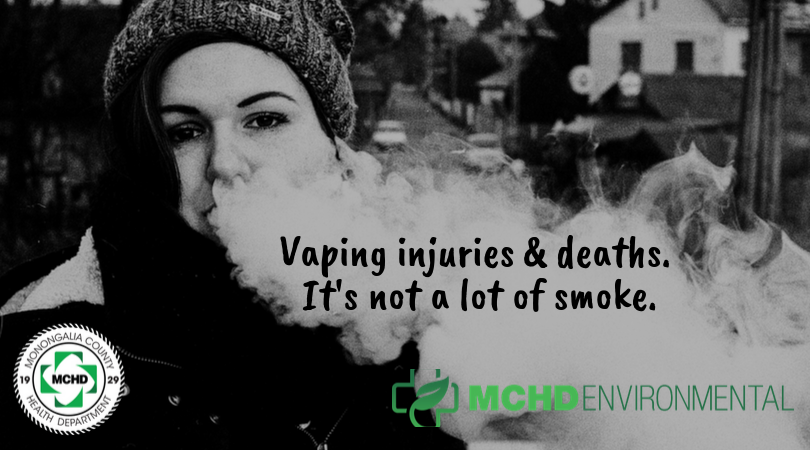Vaping: It's not the safe alternative to smoking

Oct. 16, 2019
By Mary Wade Burnside
So I never had to try to quit smoking by starting to vape instead, although many other people have.
That’s one of the issues that has emerged as the relatively young vaping industry has come under fire recently because of illnesses and deaths attributed to the practice.
Of course, here at Monongalia County Health Department, we educate against smoking cigarettes, both the traditional and electronic kind. We counsel patients at MCHD Clinical Services, MCHD Dentistry and MCHD WIC to avoid smoking. It’s not good for heart or lung health, oral health and if a pregnant woman smokes, it can adversely affect her baby in several ways.
In the case of e-cigarettes, 1,299 cases of lung injury associated with the use of e-cigarette products has been reported from 49 states, the District of Columbia and one U.S. territory, according to the Centers for Disease Control and Prevention. Also, 26 deaths have been confirmed in 21 states. These numbers are of Oct. 8 and have been rising rapidly.
Most of these patients reported a history of using e-cigarette, or vaping, products. And many of them also report a history of using vaping products that contain THC, a crystalline compound that is the main active ingredient of cannabis. This suggests that products containing THC play a role in this outbreak. It’s disconcerting that reports have noted that lung injuries associated with vaping look the same as chemical burns.
When we break down these patients by age and gender, 70 percent are male and 80 percent are under 35 percent, according to the CDC.
Disturbingly, 16 percent of patients are under 18 years old and 21 percent of patients are 18 to 20 years old.
Clearly, it seems, not everybody who took up vaping did so in order to get away from traditional cigarettes, but instead, embarked on their smoking habits via vaping products.
Part of the reason teens were encouraged to take up vaping was the flavors available. Popular flavors include bubblegum, watermelon, strawberry milk, mango, cappuccino, mint, strawberry lemonade and grape.
So far, six states—Montana, Washington, Oregon, Rhode Island, New York, Massachusetts and Utah—have banned the sale of flavored vape products.
Plus, all vaping products will be more difficult to find as some of the country’s largest retailers have announced plans to stop selling them.
All the hullabaloo surrounding vaping has some of its fans up in arms. A friend of mine swears she feels better and is healthier than when she was smoking cigarettes. She supports studying the effects of vaping but worries that the bans that are happening now are knee-jerk reactions.
I can understand her feelings. But as the CDC and researchers try to pinpoint the problem, it makes sense to take precautions, try to deter all smoking and even the sale of vaping, products.
At MCHD, we recommend that if you already vape, try to stop, or at least vape less. If you haven’t started, don’t start! That would also go for cigarettes.
The CDC is asking people to refrain from using e-cigarette products, especially those that contain THC. It’s also suggested that adults who vape avoid returning to traditional cigarettes. If you have symptoms that include a cough, shortness of breath or chest pain; nausea, vomiting or diarrhea; and fatigue, fever or abdominal pain, see a health care provider.
Pregnant women should avoid smoking and vaping. And whatever you do, don’t buy vaping products “informally,” from friends, family members or “off the street.”
The Monongalia County Board of Health already added electronic smoking devices into the definition of substances that are banned in enclosed public places in the county. The Clean Indoor Air regulation was amended to include vaping and it took effect on Feb. 1, 2017.
If you need help quitting, you can always call the West Virginia Tobacco Quitline at 1-800-QUIT-NOW. There is support out there for you.
Mary Wade Burnside is the public information officer at Monongalia County Health Dept.